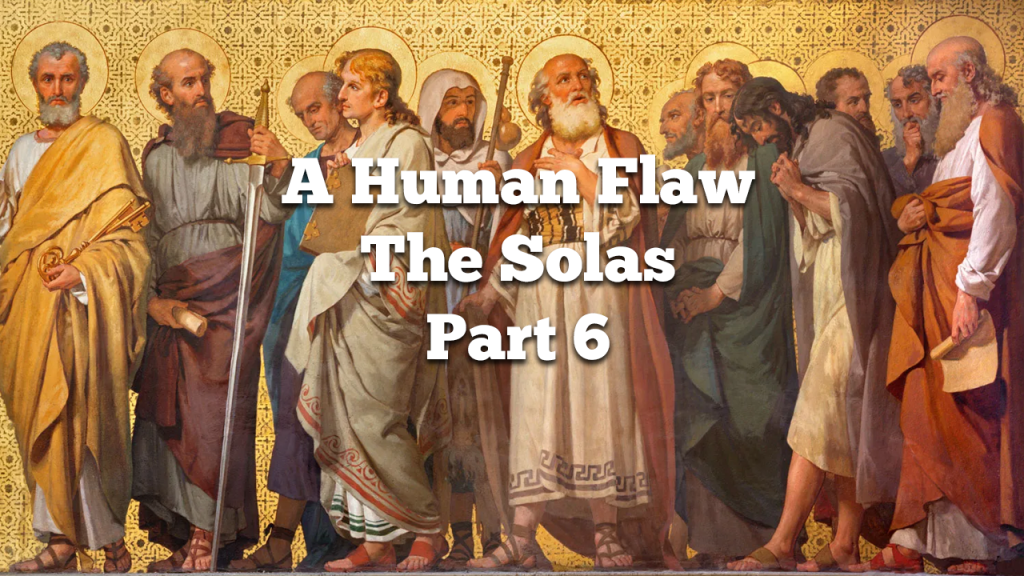This article is the sixth of a series on the “Solas” of the Protestant Reformation. They will post each Thursday here on The Post.
I was a praise and worship leader for four decades. I suppose I could still lead, but my role in life and ministry is different now. Sometimes I miss that role, especially when I see leaders overly concerned with their performance and presentation of the music. It grieves me when I see, this for that shouldn’t be their focus.
It’s easy to see that American culture exalts impressive performers and entertainers. But this is more of a human flaw than a cultural one. As mentioned more than a few times in my writings, I started following Jesus in 1971 as part of the Jesus People Movement. I don’t say this as a point of nostalgia or pride. I learned long ago that you can’t go back to what was at a special time and place, and you can’t recreate it. As far as pride? That was then. This is now. There’s no reason to be proud. It was a work of God’s grace.
One common element of those early Jesus People Movement days was humble anonymity. Oh sure, there were big bold personalities, but they weren’t the main attraction. Jesus was. Individualism was irrelevant because it was a movement of God, not of people or an institution.
It may sound corny and trite, but I miss the “one-way” sign during worship times and in those early concerts. Instead of applause at the end of a song, we raised one arm with our index finger pointed to heaven, to glorify Jesus.
Many of the praise and worship songs were Scripture-based and focused on the Lord. I miss that. Sometimes, I find it hard to join in on a worship song that’s more about me than He. I guess it’s my own form of protest. If a song’s focal point isn’t the Lord, it isn’t genuine worship of God.
Soli Deo Gloria
If this seems like a nostalgic rant, it’s not. It is an observation of how far human-oriented culture has moved the church away from holding to the fifth Sola—Soli Deo Gloria—for the glory of God alone. This was the banner of honor for the early church gathered as one united community (Acts 2:42-47). Displaced from their customary place of worship, the synagogue, ostracized and later persecuted, their common bond was glorifying Jesus.
But how was this possible in the face of opposition, even ridicule? How could the first church be so confident in their faith and united in love? Because God put His glory in them (2 Corinthians 1:22; Ephesians 1:13-14; Colossians 1:27). He came and lived in them and empowered them just as He promised (Luke 24:49; Acts 1:4-5, 8; 2:1-4).
This fifth Sola is where we see (from God’s perspective) the other four Solas all tying together. No person, no matter how spiritually minded and morally good they may appear by their own effort and will, can honor and glorify God in the way He chooses. We glorify God when His glory shines through us as living testimonies of Jesus and His grace, by faith and following what is written in His Word.
The purpose of Christ’s redemptive work on the cross was not to make us good people, although we are called to be lights in this dark world. There’s a much greater, over-arching, and eternal purpose. The Father sent His Son to restore the relationship between Him and those created in His image (imago dei) back to its original state in the garden (Genesis 1:26-28; 2:9). Adam and Eve had God’s glory as their clothing before the fall—before the serpent deceived them. They only realized they were without clothing (naked) when God’s glory disappeared, which humiliated them and left them hiding in shame from God’s presence (Genesis 3:6-11).
The awkward dance
Living each day for God’s glory is the highest honor a Christian believer can pursue (Philippians 3:7-14). But it’s an awkward dance between devotion to God and daily life in this world. It’s awkward because of our human will and our inheritance from Adam, who relinquished God’s glory for his own—our selfish nature (Genesis 3:5).
Our struggle with self-worth also makes things awkward when it comes to living a life that glorifies God (Romans 7:14-20, 25). This is where our trust (faith) needs to be in Jesus and His grace, not our emotions, nor our efforts or will, but on the truth declared in the Scriptures—
For by grace you have been saved through faith. And this is not your own doing; it is the gift of God, not a result of works, so that no one may boast. For we are his workmanship, created in Christ Jesus for good works, which God prepared beforehand, that we should walk in them. (Ephesians 2:8-10)
How do you see God’s grace at work in your life so that God is glorified?
Understanding terms—
Many of the theological terms used by Christians become like a foreign language to nonbelievers. Believers need to understand these terms well enough to put them in their own words, or as I call it IYOW (In Your Own Words).
I’ve tried to give some simple clarification of terms in these posts, but I encourage you to make your own effort to understand these terms so you can explain them IYOW to others. If there’s a specific theological term that proves hard to grasp, let me know. I’ll at least point you in the right direction for an answer if I can’t help you with my explanation.




